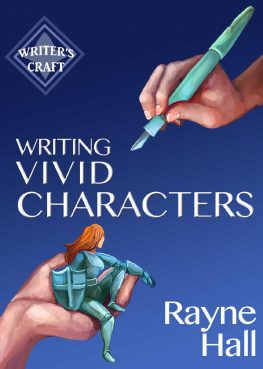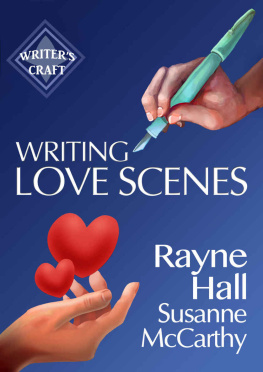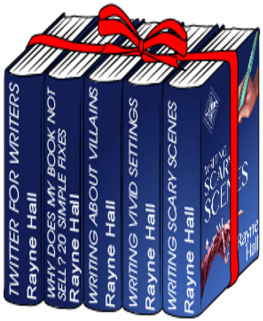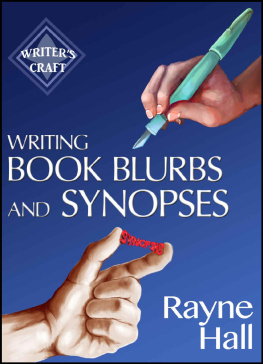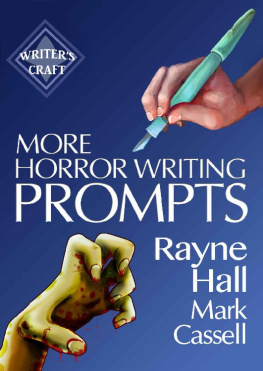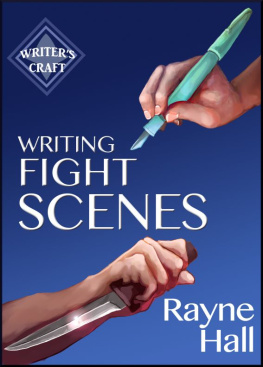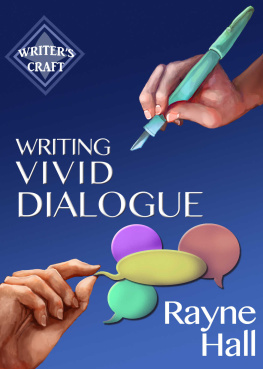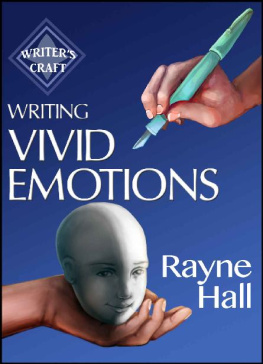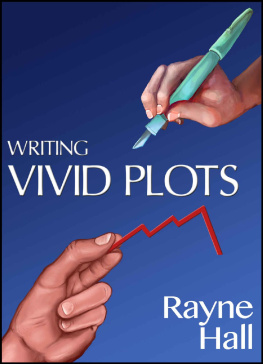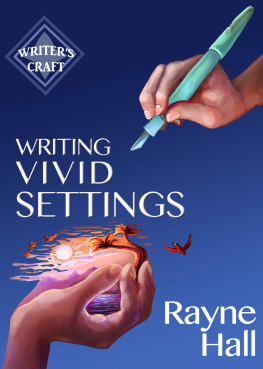Rayne Hall - Writing Vivid Characters
Here you can read online Rayne Hall - Writing Vivid Characters full text of the book (entire story) in english for free. Download pdf and epub, get meaning, cover and reviews about this ebook. year: 0, genre: Detective and thriller. Description of the work, (preface) as well as reviews are available. Best literature library LitArk.com created for fans of good reading and offers a wide selection of genres:
Romance novel
Science fiction
Adventure
Detective
Science
History
Home and family
Prose
Art
Politics
Computer
Non-fiction
Religion
Business
Children
Humor
Choose a favorite category and find really read worthwhile books. Enjoy immersion in the world of imagination, feel the emotions of the characters or learn something new for yourself, make an fascinating discovery.
- Book:Writing Vivid Characters
- Author:
- Genre:
- Year:0
- Rating:3 / 5
- Favourites:Add to favourites
- Your mark:
- 60
- 1
- 2
- 3
- 4
- 5
Writing Vivid Characters: summary, description and annotation
We offer to read an annotation, description, summary or preface (depends on what the author of the book "Writing Vivid Characters" wrote himself). If you haven't found the necessary information about the book — write in the comments, we will try to find it.
Writing Vivid Characters — read online for free the complete book (whole text) full work
Below is the text of the book, divided by pages. System saving the place of the last page read, allows you to conveniently read the book "Writing Vivid Characters" online for free, without having to search again every time where you left off. Put a bookmark, and you can go to the page where you finished reading at any time.
Font size:
Interval:
Bookmark:
Table of Contents
WRITING VIVID CHARACTERS
Rayne Hall
Book cover by Erica Syverson
2016 Rayne Hall
July 2016 Edition
All rights reserved. Do not reproduce this work in whole or in part without the authors written permission.
INTRODUCTION
Do you want to create compelling characters about whom the readers care deeply?
This book reveals professional dialogue technique to invent individuals who are so real that your readers will love or hate, fear or root for them, and so fascinating that your readers will remember them forever.
This is not a beginners guide. I assume that you have mastered the basics of fiction writing, and dont need an explanation of what characterisation is and why it matters for your story. But your characters may not be as memorable as your story deserves. Perhaps they are too similar to one another, perhaps they dont jump off the page like real people, and perhaps they lack that certain something that makes them unforgettable.
Ill offer you a toolbox filled with techniques. These are not rules every writer must follow, but suggestions you can adapt to suit your vision. You can use this guide to create a cast of characters from scratch, or you can power up the characters about whom youve written a draft.
As an experienced writer, youre probably familiar with some of the techniques I discuss. Use those sections as a refresher course and for a fresh perspective on what you already know.
If youre a novice at fiction writing, I suggest you put this book aside for now and start with a beginner-level guide.
To illustrate my points, Ill give examples from one of my books, the dark epic fantasy novel Storm Dancer. You dont need to read the book to understand the examples.
When referring to readers and characters, Ill sometimes use she and sometimes he, simply to avoid the clunky he or she constructions. If youre used to American English, my British word choices, syntax, grammar, punctuation and spelling may look unfamiliar, but you shouldnt have any difficulty understanding them.
Now lets have fun bringing the cast of your book to life.
Rayne Hall
CHAPTER 1: RECRUITING YOUR CAST
Youre the CEO of your book and in charge of whom you hire. When recruiting characters for a new project, you may have clear specifications for some roles, but only vague ideas for others. Occasionally, characters simply walk into the plot uninvited and behave as if they belong.
FROM CHARACTER TO PLOT, FROM PLOT TO CHARACTER
Developing characters in depth is a good idea. You need to know them as well as the members of your family or your closest friends, and this book is going to help you. The question is, when should you create this character profile before you start writing, or as you go along?
A related question is what comes first, character or plot? I believe that characters shape the plot, and the plot shapes the characters. Its best to develop them organically, side by side. Creating first one and then the other can lead to inauthentic stories.
If you start by creating a character with a full history, strengths, weaknesses, ambitions, traits, hopes and fears, and then write a story about him, you may discover that he isnt at all who he seemed to be. As he comes alive, hell reject the profile you prescribed for him. His reactions to plot events reveal what kind of person he really is.
If you begin with a plot, and then recruit a character to act it out, you may find that hell refuse to behave the way you intended. Hell do what he wants to do, especially if hes the strong-willed type, leaving you with no choice but to change the plot.
Im in favour of allowing characters to develop gradually and getting to know them as the plot unfolds. However, it helps to have a broad idea of each character, at least the important ones, before you start writing about them.
For instance, you probably know the gender and age group.
For the main character, I suggest you specify a trait which will encourage him to get into trouble curious or courageous are useful.
The kind of book youre writing also gives clues about characters. For example, the main character in a thriller is tenacious, determined, with a strong sense of justice, probably with a law enforcement background and fighting skills. In a traditional romance, the love interest character is male, handsome, confident, considerate, powerful and single.
PUT OUT A CASTING CALL
To recruit characters for your novel, compile a job advertisement or a casting call. Although you can do this mentally, I suggest putting it in writing.
Wanted:
Female Lead for YA Novel.
Age 14-17, student, single. Must be curious, musical and active in sports.
Job involves some travel and music performances.
Pets and personal insecurities welcome.
Wanted:
Private Investigator.
Male, 18+. Courageous, tenacious, quick-thinking, resourceful, loyal.
Must have law enforcement background, preferably in homicide or vice.
Single father (widowed or divorced) preferred.
Tough youth (poverty, slum-dwelling, parental neglect), underworld connections and martial arts skills an advantage
Job involves some fighting and considerable discomfort and danger.
Serial Killer Required
male, white, 22-29. Must be esteemed community member, handsome and popular.
IQ 130 higher. Needs excellent people skills
No previous criminal record, but experience in animal torture and minor arson desirable.
Unlike real-life job advertisements, these posts dont need to be politically correct. You can specify age, gender, ethnicity, even sexual orientation.
Once youve formulated the casting call, relax and allow applicants to pop into your head. They will come before long, probably within a day or so when you sit down with a paper and a notebook.
If you post the advertisements immediately before going to bed, your subconscious will search them out overnight and you may wake knowing exactly who they are.
INTERVIEWING THE CANDIDATES
Dont hire them without an interview, and dont believe everything they claim. In their eagerness to get the job, some characters tell lies, so ask probing questions.
I suggest you do the following exercise, which is a lot of fun but do it in private, not in your local coffee shop.
Get out two chairs. Sit on the first one. In the role of recruiter/human resources officer/casting director, ask questions, such as:
You witness a mugging two attackers against a lone woman. They have knives, you are unarmed. What do you do?
Your boyfriend breaks up with you by text message to take up with a more glamorous girl. How do you react?
This job involves hiding in a stinking rubbish skip for three hours. How do you feel about that?
Ask the questions out loud, one at a time. After each question, switch to the other chair. Now youre the job applicant. Answer the question out loud.
This method leads to astonishing insights into the character, not just in what he says, but in how he says it. Does he hesitate, evade, or answer with confidence? Does he enjoy the interview, or do certain questions make him squirm?
Even with an in-depth interview, characters wont tell you the truth about everything, and youll learn their secrets only later. Thats OK as long as the character is right for the job, unexpected facets of their personality and situations will enrich the plot.
Some characters wont audition for a role, but wait until the story is underway, then simply walk onto the set and interact with the other actors. Its up to you what to do with them. Either chase them away be firm! or give them a small part if their presence enriches the book.
FROM MY PERSONAL EXPERIENCE
When I wrote my dark-epic fantasy novel Storm Dancer , I recruited some characters after careful planning, but also hired others who simply turned up. Despite thorough interviews and ability checks, I got some big surprises later.
Next pageFont size:
Interval:
Bookmark:
Similar books «Writing Vivid Characters»
Look at similar books to Writing Vivid Characters. We have selected literature similar in name and meaning in the hope of providing readers with more options to find new, interesting, not yet read works.
Discussion, reviews of the book Writing Vivid Characters and just readers' own opinions. Leave your comments, write what you think about the work, its meaning or the main characters. Specify what exactly you liked and what you didn't like, and why you think so.

